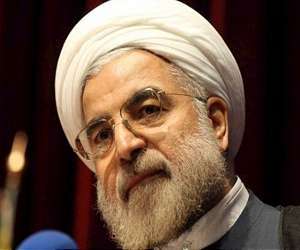Rouhani Vows Nuclear Talks 'in Good Faith', Slams West's Mideast 'Blunders'
إقرأ هذا الخبر بالعربية
Iranian President Hassan Rouhani wavered between criticism and engagement in a speech to the U.N. on Thursday, slamming Western blunders in the Middle East but signaling commitment to securing a deal on nuclear power.
Days after the United States widened bombing raids against jihadists in Iraq to Syria, Rouhani warned that regional moderates -- albeit with international support -- were best placed to resolve extremism threatening the world.
"The strategic blunders of the West in the Middle East, Central Asia and the Caucasus have turned these parts of the world into a haven for terrorists and extremists," he told the U.N. General Assembly in New York.
"Improper interference in the developments in Syria are clear examples of this erroneous strategic approach in the Middle East."
The United States has the support of five Arab countries in its air campaign to defeat what President Barack Obama on Wednesday called a "network of death" -- the Islamic State group.
Rouhani called for "moderate politicians" in the Middle East to take the lead in countering "violence and terrorism" and said it was a "myth" that his Iran seeks to control Arab countries in the region.
"The right solution to this quandary comes from within the region... with international support and not from outside," he said, warning otherwise against "repercussions for the whole world."
Rouhani is determined to lift damaging Western sanctions that have hard hit his economy and prevented oil companies from doing business in the oil-rich country.
He said Tehran wanted a final agreement that would allay international concerns over Iran's nuclear program before a November deadline, as thorny talks take place on the sidelines of the General Assembly.
"We are determined to continue negotiations with our interlocutors in earnest and good faith, based on mutual respect and confidence," he said.
A deal would be a "historic opportunity" for the West that would send a message of "peace and security," Rouhani added.
The five permanent members of the U.N. Security Council plus Germany are seeking to scale back Tehran's nuclear activities by November 24.
Iran wants U.N. and Western sanctions lifted, and is pushing for the right to enrich uranium, a process which can produce material for a bomb.
It has long denied it is seeking to develop a nuclear bomb.
Rouhani told the United Nations that "oppressive sanctions" against Iran were a "strategic mistake" and that any delay in reaching a final agreement would only raise economic costs.
"A final accord regarding Iran's peaceful nuclear program can serve as the beginning of multilateral collaboration aimed at promoting security, peace and development," he said.
Negotiators say there are major hurdles to overcome but that meeting on the sidelines of the General Assembly could facilitate high-powered diplomacy.
They have already missed an earlier July deadline to secure a deal.
Western nations agreed to lift some sanctions against Iran last year in exchange for an agreement from Tehran to curb some nuclear activities and to get to work on a comprehensive agreement.
At the U.N. for a second time since being elected in 2013, Rouhani has been courted by European leaders seeking greater support from Tehran in the war on IS, responsible for beheading two Americans and one British hostage.
But Rouhani told veteran U.S. interviewer Charlie Rose that now is not the moment to meet face to face with Obama, despite talking on the telephone at the end of last year's Assembly.
Tehran has been unusually accepting of the U.S. military action against jihadists in Iraq, where Iranian advisers are also tackling IS, but is a strong backer of the Syrian government -- a regime Washington says has no legitimacy.
Underlining the growing importance that the West affords Tehran, British Prime Minister David Cameron held landmark talks with Rouhani on Wednesday, leading Cameron to declare that Iran could be "part of the solution."
They were the first such talks between Britain and Iran since the 1979 Islamic revolution.
Rouhani also met French President Francois Hollande for a second time and is expected to meet German Foreign Minister Frank-Walter Steinmeier on Thursday.
On Friday, he will take his personal commitment to "constructive engagement" a step further when he is due to deliver a keynote address to interfaith leaders and guests at a Manhattan church, the Cathedral of Saint John the Divine.



